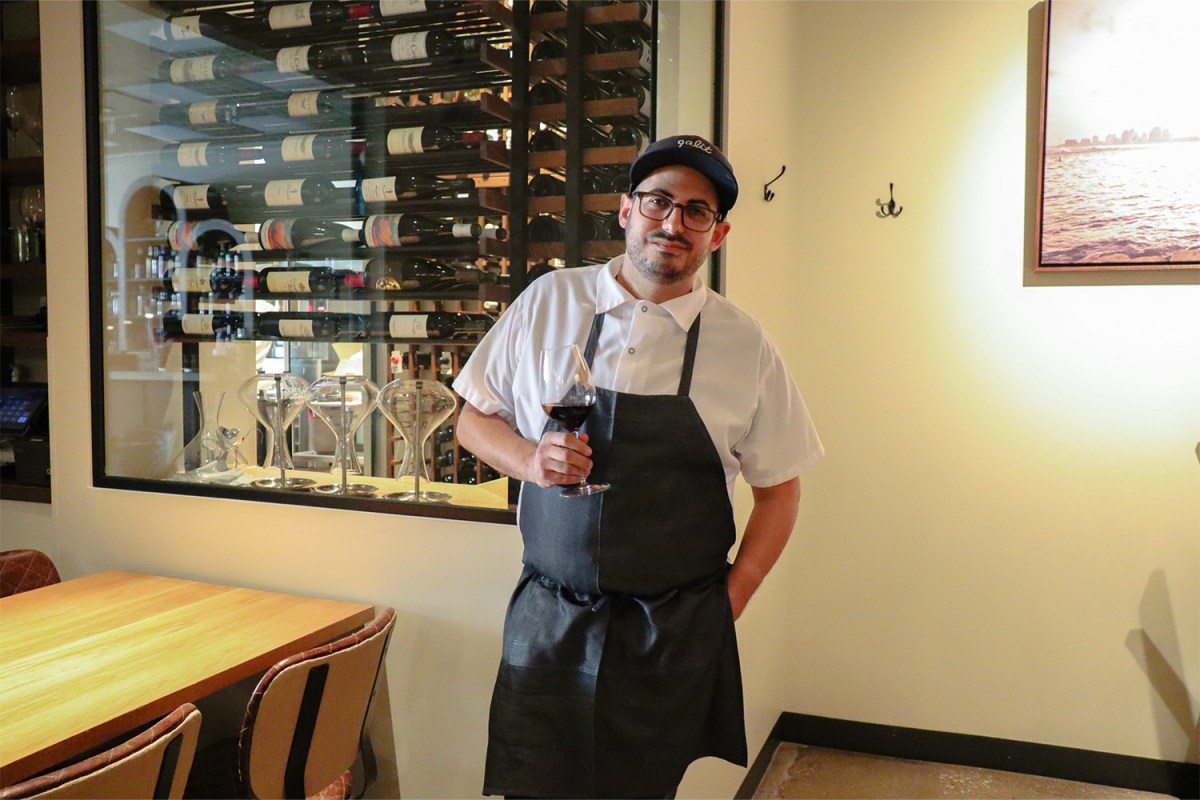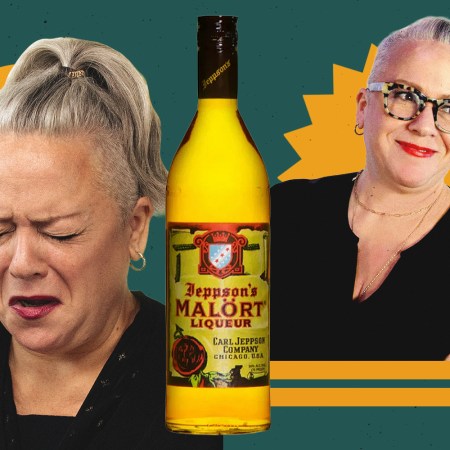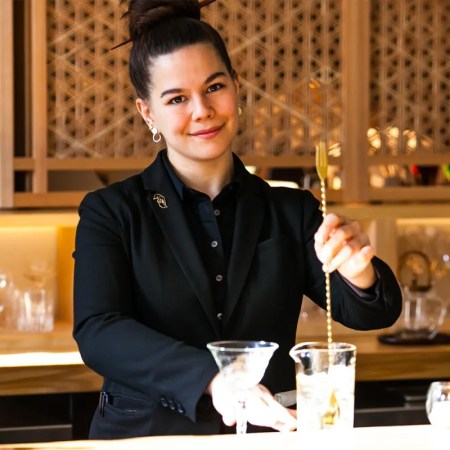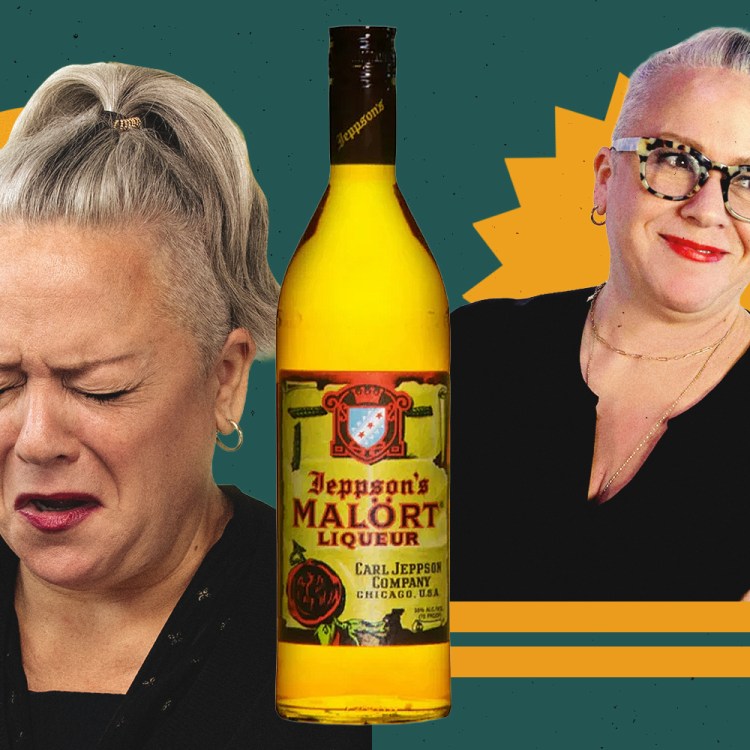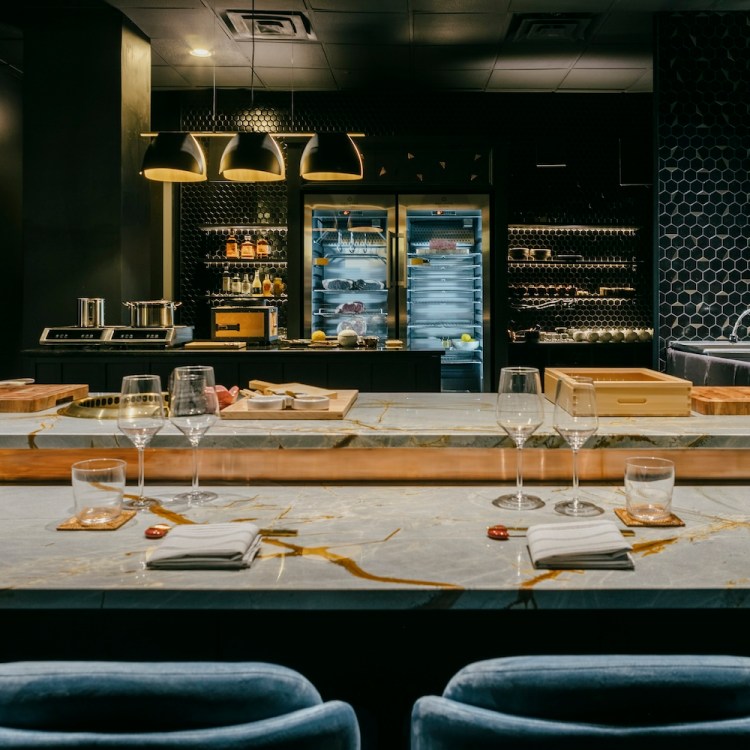Chef Zach Engel’s Michelin-starred Galit is, to put it mildly, a “very personal restaurant.” It unites the Middle Eastern flavors this rabbi’s son recalls fondly from visits to Israel with Midwestern flair, for an experience reflective of the chef’s background and values. And perhaps nowhere is the individuality of the concept so visceral as with its wine list: a bold panoply of bottles hailing chiefly from Sonoma, where Engel moved “literally to learn more about wine,” and the Middle East, home, notably, to the vintage Engel first quaffed in his early 20s, while still dating his now-wife. Margalit gave the restaurant — and his firstborn daughter — their names, and it occupies place of pride on the wine list, which stands out in more ways than one.
“I have a rule in the restaurant,” Engel says. “We do not sell French or Italian wines at Galit. We do not sell Napa wines, either.”
The choice to elide these better-known bottles makes some balk, according to Engel.
“We kind of get out of the situation where people are like, ‘I only drink Italian reds,’” he says. “You’re like, ‘That’s cool man, but maybe open your world up a little bit!’”
Part of his mission is to gently educate this sort of consumer.
“Can we get them to, like, appreciate Middle Eastern wine and not think that all of it is bad, just because of a prejudice or a preconceived notion?” he asks. “Like showing them a very well-executed wine that’s interesting and tells a story and goes with the food to kind of round out the experience.”
It’s a worthy goal, especially because, as Caroline Conner — the British-American wine expert behind Lyon’s Wine Dine Caroline — notes, wines from this region are nothing new. Vitis vinifera, the grape species encompassing pretty much every wine grape you’ve ever heard of from chardonnay to syrah, grenache to pinot gris, originates, she says, at the intersection of Armenia, Azerbaijan and Iran, only to reach Western Europe thanks to the Ancient Greeks some 2,500 years ago. But despite their storied past, Middle Eastern wines have not always maintained the highest reputation, due not only to political crises but also to religious concerns, specifically the preclusion of alcohol by Islam.
“It’s gone in two directions,” says Engel of local winemaking, highlighting, on the one hand, a “Kosher-specific” market that, he says, skews “not very good, sort of your very straightforward, grocery-store level wine,” and on the other hand a tradition heavily influenced by Europe.
“Crafting amazing wine takes generations to figure out and does rely on stability,” adds Conner. “It’s hard to develop consistent, high-quality wine regions without a supportive government.”
But things are changing — not just in the Middle East, where winemakers from countries like Lebanon and Israel are taking risks and crafting excellent wines — but also in the U.S., where consumers are growing ever more willing to try something new.
“I think in the last 20 years, we’ve come to realize that the rules are meant to be broken,” says Engel. “Loud music, tapas-style small plates dining was not OK. Having anything but French or Napa wines on the list was looked at as low-brow. The rules have changed quite a bit.”
In choosing wines from the Middle East, Engel feels he is better maintaining the identity of the restaurant.
“It’s important for us to show people that we’re still part of our humble origins,” he says. “I don’t want to stop following our rules and stop highlighting these specific regions that tell my story, because this is what makes our restaurant so unique.”
Thanks to his cultivation of close relationships with the people behind the wines, he has a stellar list of bottles many have never even heard of. Here are some choice selections, many of which are exclusive to Galit.
Margalit, Israel
To the team’s knowledge, Galit is currently the only restaurant in the country serving Margalit, a wine he discovered via a private barrel tasting at the domaine.
“It was a pretty mind-blowing experience,” he recalls, noting that the wine became a special-occasion treat for him and his wife long before finding its way onto the wine list at Galit.
“When we started, we had only the 2011 vintages, which is really cool because it was the stuff that I had tasted out of the barrel,” he says. “So we could tell that story.”
Of the bottles produced by Margalit, it’s not hard for Engel to pick a favorite.
“I’m a big cab franc guy,” says Engel of Margalit’s heavily cab-forward (around 90%) blends, supported by merlot, petit verdot, cabernet sauvignon or durif, depending on the year.
“I like it by itself, not just as a supporting varietal, like in a Bordeaux blend,” he says. “The pyrazine [a compound that can lend flavors of green pepper or roasted meat to certain wines] really plays well with a lot of our food at Galit.”
Paradigma is another of the domaine’s bottles to feature on his list: a grenache, syrah, mourvèdre blend he characterizes as “mellower,” albeit with a smoky, barbecue note. Boasting a clean finish and a lovely salinity hailing from the Mediterranean rims, the wine, Engel notes, “feels like it comes from a place, specifically. It’s not just a generic GSM blend.”
The Enigma, meanwhile, makes good use of its name: a blend that winemaker Asaf Margalit releases “every once in a while,” according to Engel.
“He doesn’t tell you what it is,” says Engel. “It is usually mostly cab and merlot, but he blends whatever he feels like for the year, and then it allows you to have the conversation about what it is that he’s doing and why.”
Agur, Israel
Agur Layam is one of Galit co-owner Andrés Clavero’s favorite wines, according to Engel, who notes that while he is “not a big syrah person all the time,” Clavero, with his Cuban-Palestinian origins, is “a big tempranillo guy.”
“So this goes a little bit more towards him,” says Engel.
A 50/50 blend of syrah and mourvèdre, the wine, Engel says, “helps people feel like it’s still a syrah, but it’s uniquely its own wine. The mourvèdre isn’t really hiding it.”
Characterized by Engel as uniting “really rich fruit” and a bit of salinity, Agur’s syrah has a briny, olivey character with a non-negligeable red fruit note. The wine’s floral quality especially, Engel says, makes it the perfect pair for the restaurant’s more heavily spiced dishes, redolent with baharat or ras el hanout.
“It’s a very easy sell for us with a lot of our lamb dishes,” he says. “The one that we have now is kind of like a fava bean, mushroom lamb kebab, and it’s very umami-rich. So this one competes with it, but not in the same realm.”
The wine and dish exist instead in a complementary opposition: the wine is “floral and spicy and salty,” he says, while the dish is “umami and fresh and yeasty.”
Mersel, Lebanon
Engel had been buying wines from Eddie Chami of Lebanon’s Mersel wines for years before the two finally met last March.
“He came into town, and now we have a good personal relationship,” says Engel. “We stay in touch and we try and just sell as much of his stuff as we can get our hands on.”
Chami is notably embracing natural, low-intervention methods and native grapes including merwah, a light-skin variety that purports to be closely related to semillon. At Mersel, 150-year-old indigenous vines bear the fruit that features in the piquette, a sparkling wine whose secondary fermentation is launched with organic honey from the vineyard’s own bees.
“They’re the new wave of winemaking from a country where people really only know about Chateau Musar, if they know anything about it,” says Engel. “He’s a really exciting winemaker to me.”
Ramot Naftaly, Israel
Ramot Naftaly’s Barbera is Engel’s go-to to change the minds of clients who claim Italian reds are their be-all and end-all.
“If someone’s like, ‘Where’s the Italian wine?’ we can be like, we have an Italian grape, and it’s grown not that far from where you would get a Barbera, so just try it,” he says.
One of the first wineries in Israel to produce barbera, Ramot Naftaly’s grapes develop differently here than they would in Piedmont, with a deep purple color and an intense, floral aroma. Barrel-aged in new French oak, it’s a unique exploration of a grape that’s familiar to many, revealing a whole different side of its personality.
Dalton, Israel
Anyone who grew up drinking Kosher wine at Passover is probably balking at Dalton’s inclusion on this list.
“It’s like…‘Your lame dad who’s close to retiring’ wine, you know?” says Engel. “It’s just very uninteresting, very bland. It’s your classic Robert Parker 95 score kind of stuff, but kosher, so much worse.”
But luckily, winemaker Guy Eshel decided that it was time to make a change. His Asufa line is categorized by the brand as the winemaker’s “personal playground,” and to hear Engel tell it, it was a must for the winemaker.
“He was like, ‘I’ll still make your wines here, but like, I need to do something else,’” recounts Engel. “’Or else I’m gonna have to leave.’”
Dalton agreed to let him experiment, and we’re all lucky he did. His Majestic, from Galilee, sees 40-year-old Carignan from the foothills of Mount Tabor undergo two fermentations — one traditional, the other carbonic — before spending 10 months in old oak. The resulting wine boasts balanced, mellow tannins and a phenomenal, fruity juiciness.
“It’s one of my favorites of the last year,” says Engel. “It has this openness about it, where it’s like, ‘You can put any food up against me, and I’ll be there.’”
Engel also has a soft spot for Eshel’s pét-nat, a sparkling wine that undergoes a single fermentation as opposed to the double fermentation used to make Champagne. Boasting a blend of Semillon and a touch of Muscat of Alexandria, the sparkler is fresh and citrusy — perfect, Engel says, for Hanukkah.
“Who wouldn’t want to eat latkes with pét-nat?” Engel says. “And it’s Kosher!”
This article was featured in the InsideHook Chicago newsletter. Sign up now for more from the Windy City.
